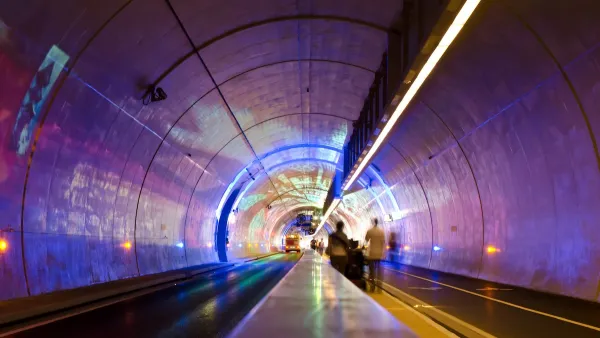Jean-Francois Mayet, the mayor of Châteauroux, introduced free ridership in a bid to turn around his town's failing transit system. Eleven years later, total ridership has increased 208 percent. Henry Grabar examines whether free transit is scalable.
Châteauroux isn't the first city to offer free public transportation, but it's the first example of a large city to do so. Henry Grabar observes, "the otherwise ordinary French town has become a canary in the coal mine of transportation policy, closely watched by the dozens of other municipalities in various stages of free transit experiments." A French report [PDF] released this year found that per person ridership in Châteauroux is up from 21 to 61 trips a year; and the city turned a profit in '03, '04, '05, and '07, after eliminating bus fares in 2001.
"The motivations for making a transit system free are obvious," writes Grabar. "Increased ridership can relieve traffic, improve the environment, boost the system's efficiency, give residents more spending money, help the poor, and rejuvenate central business districts." The results of free mass transit in Châteauroux have been positive, but "[t]here were growing pains: the number of slashed or tagged seats grew from a dozen in 2001 to 118 in 2002. Drivers complained that passengers treated the bus like a personal car, expecting to be dropped off at their doorsteps."
Bruno Cordier, author of a 2007 report Totally Free Mass Transit [PDF], attributes Châteauroux's success to not only free ridership, but also the simultaneous expansion of its transit network. He cautions that "[g]ratuity alone does not make the network attractive" and argues that "the system won't work at all in big cities, where 30-40 percent of transit revenue comes from ticket sales, as opposed to a mere 14 percent in Châteauroux."
The demonetization of the transit system in Aubagne (pop 100,000) has also proven successful, but the verdict on whether the same can happen in big cities will soon be put to the test. "At the end of this year," reports Grabar, "Tallin, Estonia (pop. 406,000) will eliminate fares on its transit system for residents, making it the world's biggest city with free mass transit."
FULL STORY: What Really Happens When a City Makes Its Transit System Free?

Planetizen Federal Action Tracker
A weekly monitor of how Trump’s orders and actions are impacting planners and planning in America.

Chicago’s Ghost Rails
Just beneath the surface of the modern city lie the remnants of its expansive early 20th-century streetcar system.

Amtrak Cutting Jobs, Funding to High-Speed Rail
The agency plans to cut 10 percent of its workforce and has confirmed it will not fund new high-speed rail projects.

Ohio Forces Data Centers to Prepay for Power
Utilities are calling on states to hold data center operators responsible for new energy demands to prevent leaving consumers on the hook for their bills.

MARTA CEO Steps Down Amid Citizenship Concerns
MARTA’s board announced Thursday that its chief, who is from Canada, is resigning due to questions about his immigration status.

Silicon Valley ‘Bike Superhighway’ Awarded $14M State Grant
A Caltrans grant brings the 10-mile Central Bikeway project connecting Santa Clara and East San Jose closer to fruition.
Urban Design for Planners 1: Software Tools
This six-course series explores essential urban design concepts using open source software and equips planners with the tools they need to participate fully in the urban design process.
Planning for Universal Design
Learn the tools for implementing Universal Design in planning regulations.
Caltrans
City of Fort Worth
Mpact (founded as Rail~Volution)
City of Camden Redevelopment Agency
City of Astoria
City of Portland
City of Laramie





























